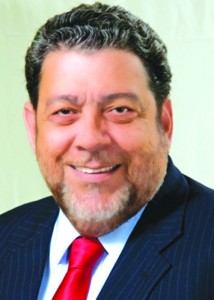
Vincentian Prime Minister
Dr Ralph Gonsalves
Vincentian Prime Minister Dr Ralph Gonsalves said Monday that he would use his six-month term as chairman of the Caribbean Community (Caricom) to deal with the deleterious effects of climate change on the socio-economic future of the 15-member bloc.
St Vincent and the Grenadines, St Lucia, and Dominica are now emerging from the effects of a weather system that left a trail of death and destruction over the Christmas holidays.
Caribbean countries have also had to deal with the annual hurricane season and in many cases, like in Haiti, unseasonal rains that cause widespread devastation. “The big issue… is global warming, climate change. We are having systems affecting us outside of the normal rainy season and the normal hurricane season,” he said, making reference to the floods in April last year and the Christmas Eve rains that resulted in the deaths of nine people and hundreds of millions of dollars in damage.
“There are lots of monies which countries talk about for adaptation and mitigation to climate change. But I haven’t seen the money yet and we have to use our diplomacy as a region and we have to be aggressive with our climate change centre in Belize.
“In my term as chairman of Caricom, this is one of the issues which you will recall I said earlier on… I want dealt with during my term in a continued serious and structured way, (and it) has to deal with the deleterious effect of climate change and to get the requisite responses from the international community in relation to this matter.”
Gonsalves told a news conference that the region does not contribute “anything to these manmade weather systems, these problems with putting so much carbon dioxide in the atmosphere. “We are… on the front line,” he said, adding that “this is an issue which is big”.
Gonsalves said that efforts were now underway to stage an international donors’ conference to help the three affected islands recover and rebuild their battered infrastructure. He said he had already received a letter from Antigua and Barbuda Prime Minister Baldwin Spencer, who is also chairman of the Organisation of Eastern Caribbean States (OECS), outlining plans for an international donors’ conference.
The St Vincent and the Grenadines prime minister told reporters that an insurance scheme organised through the World Bank, to which all the Caribbean countries contribute, does not go far enough. “To the extent that the monies you get from the Catastrophic Relief Insurance System is fairly minimal, but, of course, every little bit helps,” he said.
Gonsalves said he had already written to the leaders of several countries and was now waiting to see “what kind of grant assistance we can get, because we really need grants preferably. “The World Bank will give soft loan monies, the CDB (Caribbean Development Bank) will give soft loan monies, the European Union will give grants, Venezuela will give grants, (and) Taiwan will give grants.”
In his New Year’s message, President Donald Ramotar had alluded to what he described as the “very important… issue of climate change and the challenges it poses.” He noted that in recent weeks “we have witnessed extreme weather in Guyana and the wider Caribbean. This has resulted in millions of dollars in damage and loss of life. The scientific evidence is showing that for our region, which is one of the most vulnerable, these weather events will become more frequent as the impacts of global climate change intensify.”
In this regard, Ramotar said he intends this year to work with other Caricom heads to ensure regional action on climate change is given top priority. “Recognising our own vulnerabilities here in Guyana, efforts will intensify in 2014 to improve and expand infrastructure, in particular our sea and river defence and drainage and irrigation systems; enhance our forecasting capabilities and response mechanisms; and build climate resilience in the social and productive sectors of our economy. These will be done within the framework of our Low Carbon Development Strategy,” the president assured. (CMC)



